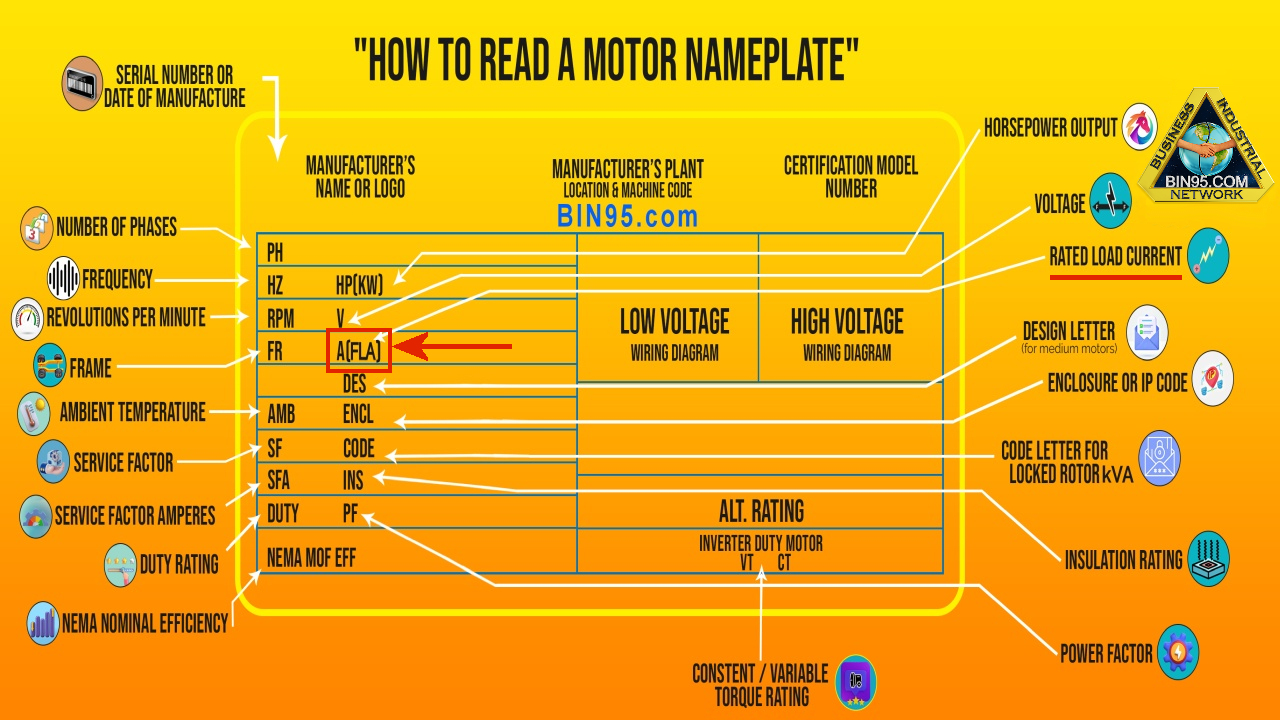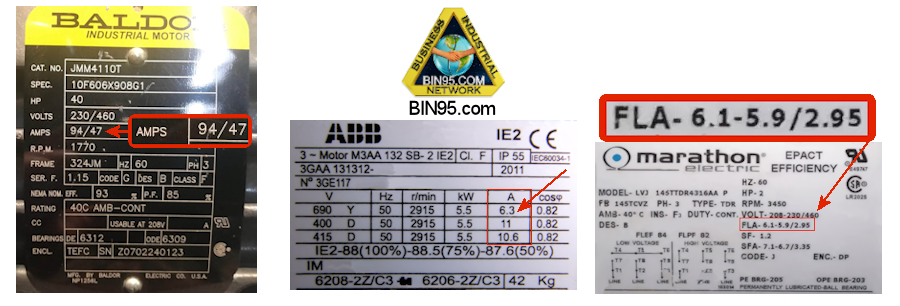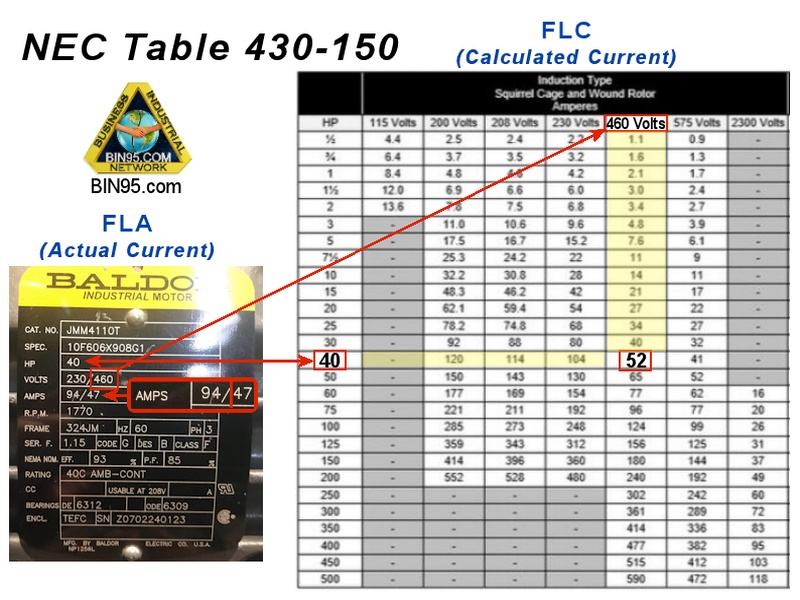- Home >
- articles >
- electrical >
- motor nameplate fla
FLA on a Motor Nameplates
Starting with the How to Read Motor Nameplate
Definition:
What is motor FLA? FLA on a motor stands for Full Load Amperage. It is the full load current amperage indicated on a specific motor nameplate. That amperage was found by the electric motor manufacturer running that motor at the other specifications displayed on the motor nameplate data.
Reference the difference between FLA and FLC below for more details.
Before getting to what the letters FLA on a motor nameplate stand for, the how-to-read motor nameplate infographic is below. At the end, we look at the difference between FLA and FLC.
How to Read Motor Nameplate:

In how to read motor nameplates, the infographic above highlights the area where the motor FLA is on the nameplate. Standardized electric motor nameplate formats help electricians and technicians quickly identify essential information. Information includes horsepower rating, voltage rating, efficiency class, operating speed range, insulation class, and other critical specifications.
The motor nameplate data will vary slightly based on the manufacturer, country/standards, motor type and model, and other factors. Below are examples of the FLA rating in Amps on electric motors by various manufacturers and types. The one thing most common is the FLA being indicated on the nameplate as “A” for amps.
What is motor FLA? Examples:

You first noticed in the electrical motor nameplate examples above that "FLA" indicated the full load amperage on only one motor template. The other two nameplates used only “A” or the whole word “AMP” to indicate the field with the full load amperage(s). Using the letter “A” is by far the most common. The different ways it is displayed may be why, when someone runs into FLA, they ask what the letters FLA on a motor nameplate stand for.
What do the letters FLA on a motor nameplate stand for?
The article started with a formal definition of electric motor FLA. In short, it is the full load current found by the manufacturer while testing the motor. The nameplate often indicates the FLA at different voltages, wiring configurations, and other variables displayed.
In taking a closer look at the ABB motor template previously shown. The table below highlights the 3 configurations the manufacturer tested the ABB motor for.
V
Config
Hz
r/min
kW
A
cos
690
Y
50
2915
5.5
6.3
0.82
400
D
50
2915
5.5
11
0.82
415
D
50
2915
5.5
10.6
0.82
You can hover over the data table headings for the motor nameplate. For a reminder of the acronym's meaning.
The motor was tested at 690, 400, and 415 volts. Now let us look closer at the 400-volt row. The motor was wired for that voltage in the “D” Delta configuration. All three FLA tests were done at 50hz, 2915 rpm, and 5.5kw.
Motor FLA stands for Full Load Amperage. It refers to the current that a motor draws from the power supply when operating at full load, which means it works at its maximum capacity. FLA is an important specification to consider when selecting and sizing electrical equipment, as it helps determine the appropriate circuit protection and electrical components required for safe and efficient motor operation. By knowing the motor's FLA, you can ensure that the electrical system is adequately designed to handle the motor's power requirements.
What is the difference between FLA and FLC?
The Full Load Current(FLC) is typically used to determine the theoretical capacity of a motor. In contrast, Full Load Amps (FLA) describes a particular motor's actual known capacity. Thus, system designers use the FLC to size and design cables, overcurrent devices, switches, etc. Whereas those who have a motor in their possession (plant engineers, electricians, etc.) tend to work with FLA because it is right on the nameplate of the motor in question.
FLC is considered the proper methodology when sizing electrical systems, as it generally covers all HP motors. Since one motor design has different losses than another, two motors with the same HP rating may have a different FLA rating. And as we all know, motors don't last forever. A replacement motor may have a slightly higher FLA.
Is it good practice to use the FLC tables from the NEC when sizing anything?
That is not a silly question, as there is a difference between FLA and FLC.
- FLA is the full load current motor rating on the nameplate.
- FLC is the full load current rating of the motor that you can find in the National Electrical Code table.
FLA (nameplate rating) is used in calculating the rating of thermal overload protection. In contrast, FLC (NEC table rating) calculates the conductor’s rating and over-current protective device. The current values are not equal, as you can see if you check the table in the NEC and compare it with an actual motor nameplate FLA.

I always say there are exceptions to every rule. The exceptions for using the nameplate FLA when sizing wires and other conductors, ground fault protection, and disconnects are:
Motors built to operate under 1,200 rpm.
Motors that have high torques (and thus higher FLCs).
Multispeed motors (FLC varies with speed).
A listed motor-operated appliance.
Use the nameplate FLA for sizing separate motor overload protection [430.6(A)(2)].
Download this handy Motor Nameplate Details PDF as a quick reference.
Related Course: Motor Controls Training Course.
Motor FLA FAQ:
| What is motor FLA? | FLA on a motor stands for Full Load Amperage. The full load current amperage is indicated on a specific motor's nameplate. |
| How is motor FLA determined? | That amperage was found by the electric motor manufacturer running that motor using the other specifications displayed on the motor nameplate data. |
| Where to find FLA on electric motor nameplate? | FLA is labeled on the nameplate as 'A' for amperage and sometimes with the word 'AMP'. Rarely you will find it marked as 'FLA' on the motor nameplate. |
| What Is the difference between electric motor FLA and FLC? | The Full Load Current(FLC) is typically used to determine the theoretical capacity of a motor. In contrast, Full Load Amps (FLA) describes a particular motor's actual known capacity. |
| Can I use FLC on NEC table to size thermal overload? | No, FLA (nameplate rating) should be used to calculate the thermal overload protection rating. |
| What to do if there is no motor nameplate? | Contacting the motor manufacturer is the best action. Most motors have an FLA that is below the NEC table FLC value. So, using the table as an alternate may damage the motor. |

